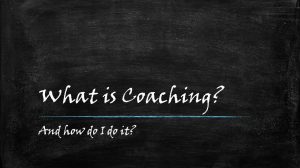 Coaching is undoubtedly one of the most important competencies for a leader. Whether you are in sales or in manufacturing, if you lead others you need to be great at coaching. Many leaders struggle with coaching and this occurs for a variety of reasons. The biggest issue is that many leaders and individuals don’t understand what true coaching is. This is not their fault. The word coaching has been thrown around so much that it is no wonder individuals are confused when someone is in need of it. Below are 4 key components that I believe are crucial to better coaching conversations.
Coaching is undoubtedly one of the most important competencies for a leader. Whether you are in sales or in manufacturing, if you lead others you need to be great at coaching. Many leaders struggle with coaching and this occurs for a variety of reasons. The biggest issue is that many leaders and individuals don’t understand what true coaching is. This is not their fault. The word coaching has been thrown around so much that it is no wonder individuals are confused when someone is in need of it. Below are 4 key components that I believe are crucial to better coaching conversations.
Relationships are Essential
Sounds like common sense, but most coaches don’t know the first thing about their employees. The key to building a trusting relationship with those you wish to coach (I say this because not every coach is a leader nor is every person being coached and employee) is to listen more. Especially at the beginning. Ask lots of questions and listen more than you talk. You cannot develop a trusting relationship nor uncover what motivates individuals unless you listen.
When building the coaching relationship, the following concept is the most important. If you glean anything from this article, make it this. Coaching is something that you do with the individual and not to them. Many individuals believe you can force coaching or knowledge upon someone, you cannot. Have you ever heard or said, “coach them up or coach them out?” I can admit that I am guilty of saying this a time or two, but what I now know is that this make or break attitude of coaching will never develop the relationship or trust needed for me to have impactful coaching conversations. Would you trust someone to coach you if you knew they had said the previous statement and/or had that attitude towards you? I wouldn’t and neither will your employees.
The Employee Owns the Growth
The employee must take ownership of the change and their personal growth. I often say 80% of the development and change that comes from coaching belongs to the individual, the coach only owns the other 20%. Unfortunately, this is often not the case. The coach often tries to micro the process and control every aspect of the development. If this is you, you have been doing it wrong. The coach gives advice, facilitates goal setting, makes suggestions, and directs the individual to the content to be learned or behaviors to be modified. At the end of the day, the coach cannot make them do it. The individual must want it and must own the growth.
In my experience, I have had a few individuals upon termination say, “but I never received any coaching.” Have you ever heard this even though you know good and well that you coached them till you were blue in the face? The issue was not that I did not coach them, it was that I didn’t make them own the growth (or lack thereof). They simply didn’t take my coaching or advice, and they didn’t own it because I didn’t review outcomes or follow up consistently; I just kept preaching. Don’t make the same mistake.
Coaching is Changing the Individual at the Core
Coaching is often done incorrectly, it is often about tricks, tips, or other processes. This further stems from the erroneous use of the word coaching. If you are teaching someone how the new sales process works or how to input something; this is not coaching, that is giving direction or training. Do not confuse coaching with learning or training. You must change something about the individual at the core level. Change who they are, not what they do for you, in the performance of their job duties. An example of this would be someone who constantly cuts others off during a conversation. This is an interpersonal skill and would change who they are at the core of their being if the change was implemented successfully.
The Coach is a Passenger
The coach is not in control of the process. Remember, the individual is responsible for owning at least 80% of the growth. The coach’s role is that of the passenger. The coach helps navigate the individual’s path to enlightenment and growth. Coaches set goals, create content, and facilitate the process for growth. The coach is not driving nor does the coach own the growth. Coaches often overstep their role and in doing so stunt the individual’s opportunities for self-discovery and enlightenment. Stay in the passenger’s seat, your proteges will be better for it.
Coaching is often confused with other processes such as training. This is due in large part to the misuse of the word coaching. In our haste to get to coaching, we overlook crucial aspects of the process. We must develop strong trusting relationships with those we wish to coach. We must understand, and so must the individual being coached, that they own the growth and outcomes. Coaching should change the individual at the core of who they are, not what they do. Most importantly the coach must understand the rules and bounds in which coaching should occur, coaches are just the passenger. Sit back, enjoy the show, and watch your people grow.
One thought on “4 Secrets to Optimizing Coaching Conversations”
Comments are closed.